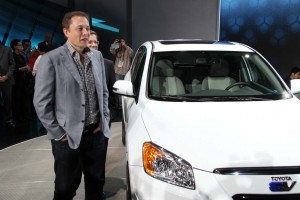While Tesla Motors CEO Elon Musk claims the battery-car maker came out on top in its battle with the New York Times over a critical review, he also claims the bitter dispute wound up costing Tesla “a few 100” lost sales and as much as a $100 million hit to its stock valuation.
The February 8th story in the Times claimed the Tesla Model S sedan driven by reporter John Broder ran out of power during a drive from Washington, DC to Boston, forcing Broder to load it on a flatbed to reach a charging station so he could complete the trip.
In a noisy he-said/she-said dispute, Tesla CEO Musk provided information from the Model S sedan’s onboard data recorder which appeared to suggest the reporter made mistakes along the way that resulted in the battery-car running out of power early. A statement from the Times acknowledged Broder may not have used “especially good judgment,” though it also insisted Tesla made some mistakes, as well.
Who came out on top is likely to be a matter of ongoing debate. Battery car proponents have hailed Musk – who made his initial fortune as a PayPal founder before launching Tesla – for standing up to the Times. Critics caution that even if Broder did make some mistakes he underscored the limits of battery propulsion, especially on longer journeys.
That appeared to be an issue for some of the thousands of buyers on the Tesla waiting list. During an interview on Bloomberg TV, CEO Musk acknowledged that a “few 100” customers have canceled their orders for the Model S, which was launched last July but which remains in relatively short supply.
Musk suggested that the most damaging part of the Times’ story was an image of the Model S being loaded on the flatbed trailer.
“It doesn’t matter if you’re right or wrong, you don’t battle the New York Times,” Musk said, a reference to the traditional argument against battling with a company that “buys ink by the barrel.”
“But, to hell with that, I’d rather tell the truth,” added Musk, who chose to fight back using social media, launching his campaign with a Twitter feed that claimed the Times report was a “fake.”
In a follow-up report, Time editor Margaret Sullivan wrote of reporter Broder’s test drive, ” I am convinced that he took on the test drive in good faith, and told the story as he experienced it. Did he use good judgment along the way? Not especially.”
(NY Times admits reporter may have used poor judgment but insists Tesla also made mistakes.Click Here for more.)
Analyst Jim Hall, of 2953 Analytics, does not believe the long-term impact on Tesla will be serious, noting there are many buyers willing to get in line to replace those who canceled their Model S orders. Other analysts echo that sentiment but warn that Tesla still will need to prove its battery cars are viable in real world use if it hopes to win over mainstream buyers long-term and not just an initial wave of green-minded and tech-savvy buyers.
Meanwhile, the challenge will be to win back investors who might have been scared off by the debate. According to Musk, a sell-off by nervous Tesla stockholders “probably affected us to the tune of tens of millions, to the order of $100 million, so it’s not trivial.”
As of early Tuesday morning Tesla shares were trading at just above $34 and trending downward, plunging from a recent peak of $39.48 on the day before the NY Times article was published.
In fact, Tesla shares rebounded in the following days as Musk launched his effort to refute the Times report. But while he might blame the paper for the company’s poor performance in the stock market in recent days there’s another factor to consider: Tesla’s weaker-than-expected financial performance during the fourth quarter.
(Tesla losses worsen, though maker promises brighter future. Click Here for that report.)
While it dropped $89.9 million into the red, Tesla promised that it will turn its first profit during the first quarter of 2013, months ahead of its earlier forecast. Observers suggest it may take proof that Tesla can deliver to put its stock price back on track, whatever the reviews of the Model S going forward.


This sounds a lot like Tesla posturing before they file a lawsuit to get some cash from the NYT – so Tesla can keep operating at a financial loss?
The odds of Tesla being able to bring a successful lawsuit against the NY Times is akin to Mitt Romney coming back in the 2016 election. They’d have to show malice and intent, among other things. And all they would do is then bring this in front of a jury which means all the niggling issues of driving an EV, the Model S in particular, would be slowly digested by the public. A lose-lose situation.
Paul A. Eisenstein
Publisher, TheDetroitBureau.com